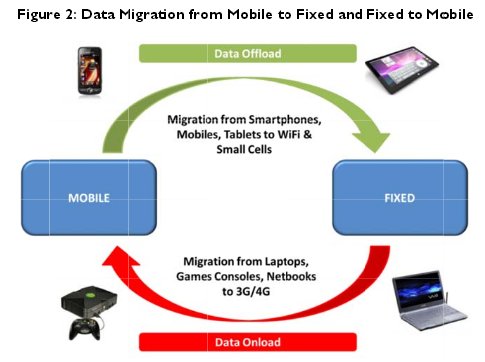Most mobile data will soon be offloaded to Wi-Fi networks, says Juniper Research

This year, almost half of all mobile data traffic will be offloaded to Wi-Fi and other local networks, according to a report published by UK-based Juniper Research.
Nitin Bhas, the report's author, says that video streaming, including on-demand services, is one of the things driving data offloading to Wi-Fi networks. "For example, in the UK, the BBC's iPlayer has become an increasingly popular method and the service has recently seen a record number of requests for TV and radio programmes to be streamed or downloaded," he says. Greater use of online radio services, such as TuneIn, rather than free FM broadcasts is presumably another factor.
"The proliferation of mobile broadband devices, along with the unlimited data bundles from operators, has led to network congestion and deteriorating network quality," says Juniper.
The report forecasts that the mobile data traffic generated by smartphones, feature-phones and tablets will grow ten-fold to more than 90,000PB (petabytes) by 2017, "equivalent to almost 42 quadrillion tweets or approximately 7 billion Blu-ray movies." It predicts that about 60 percent of that data will be offloaded, which means that offload services could become an increasingly important consideration when selecting a network carrier.
In response, the networks can either build denser networks with new masts closer together, or offload the data to wired networks. Of course, they are doing both. However, it takes a long time to build out cellular networks. This is driving carriers to offload data to their own and other people's Wi-Fi networks, and to "small cell networks" such as micro-, pico- and femtocells.
The "small cell" networks allow the carriers to provide mobile services that are not currently possible with Wi-Fi. In the long term, Juniper therefore expects femtocells to be integrated into Wi-Fi hotspots.
Juniper says: "Offloading is an effective network congestion reduction strategy to solve the overload issue compared to scaling and optimisation. It enables network operators to reduce the congestion in the cellular networks, while for the end-user it provides cost savings on data services and higher bandwidth availability."
Some mobile carriers, including AT&T in the US, are already deploying their own public Wi-Fi hotspots. This enables them to seamlessly pick up data traffic from their users' smartphones when they are within range. Juniper adds that "the availability of widely deployed Wi-Fi networks provides the operators with a good value proposition."
In the UK, O2 has been rolling out a Wi-Fi network in central London, and this week announced coverage at Canary Wharf. However, from July 1, O2 customers will lose access to BT Openzone hotspots, with the ending of a four-year deal.
Juniper points out that there is "data onload" as well as "data offload". In this case, traffic that would normally have travelled on a wired network is routed via the increasingly-congested mobile network. Examples include the use of USB 3G modems and the tethering of laptops, tablets and other devices to mobile phones.
Mobile Data Offload & Onload: Wi-Fi, Small Cell & Carrier-Grade Strategies 2012-2017 costs £1,750 from Juniper Research. There's also a free Whitepaper: Data Offload ~ Connecting Intelligently (registration required).
